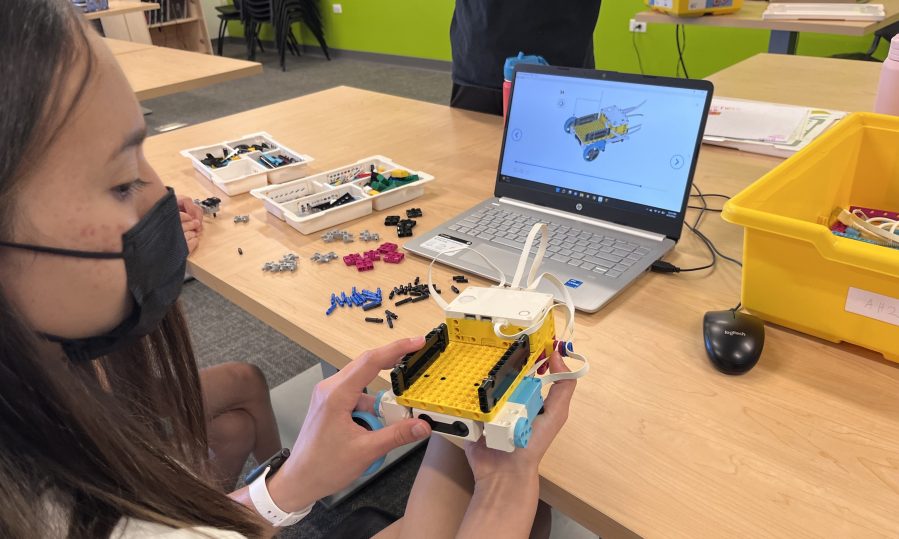Kids spend the summer in STEM camp

For kids across the country, it’s summer vacation time.
And in between days at the playground or family trips, some kids are staying busy learning advanced tech skills.
Though summer camps across the board saw a surge in early enrollment, one option popular with families is STEM camps, which offer training in science, technology, engineering and math.
The idea is that camps like these keep young brains active outside of school and could even inspire the next generation of tech leaders.
On the outskirts of Chicago, one summer camp is hoping to do just that. WBEZ’s Susie An has the story.
At a Code Ninjas center in suburban Chicago, kids are learning about robotics and how to program and code. Tensions are high as three teams race to build a cart out of Legos. The cart is attached to a computer program, but a bug was intentionally introduced into that program, and the kids have to fix it.
Jacob Liokumovich, who’s headed to the sixth grade, has chosen to work alone.
“I like building whatever comes to me while I’m building. That’s how I build,” he says.
Soon to be seventh-grader Alarese Gaden and third-grader Oliver Liokumovich have joined forces.
“I have a lot of Lego sets at home that I build with,” Alarese says.
The youngest team is made up of three 8-year-olds. The goal is to see who can program the fastest cart.
The coding camp’s owner and director, Nawroz Pirani, says it won’t be such a rude awakening for these kids once they go back to school. He also has kids building their own websites and designing games. This week of camp costs $349.
“It’s not your traditional type of learning,” Pirani says. “They’re learning a coding language and STEM skills, and it’s going to be useful for them.”
Pirani says those STEM skills are important now, but he predicts that in the next 10 or 15 years, it’ll be even more necessary for people to know some kind of computer language.
Back in the robotics class, the teams have constructed their carts and now they’re going through lines of code. But some are hitting a few snags. Alarese is disassembling the cart.
“I’m trying to fix it because this got taken off, and we have to re-add the wheels,” she says.
Her partner, Oliver, isn’t paying much attention.
The team of 8-year-olds is being squeezed for time. Twins Michael and Gabriel Mendez have become enamored with Fred and Fredalina, Lego characters they created who have an extensive backstory.
“We need to deliver Fred and Fredalina’s lunch,” the twins say.
Teammate Henry Voicu tries to get them back on track.
“We’re not going to deliver food to Fred and Fredalina,” Henry says.
In the end, everyone is able to successfully debug their cart programs, including the team of 8-year-olds. But the kids don’t have enough time to see whose cart would’ve been the fastest. Although most suspect that Jacob, the sixth-grader who worked alone, would’ve won. But he’s being modest about it.
“I mean, it’s been the fastest for pretty much everything, but maybe. I really don’t know,” he says.
He’ll be coming back to later sessions to test more of his skills.
Related links: Insight from Meghan McCarty Carino
We did a show last year with the CEO of one of the highest-profile student coding programs, Girls Who Code. CEO Tarika Barrett shared how the program adjusted during the pandemic to teach students in areas with limited internet access.
She said it took a lot of coordination.
One funder for some coding summer camps is the National Security Agency. Yes, the government.
Bloomberg has a piece on the program, called GenCyber, which consists of over 100 camps across the country. The agency funds them but does not set the curriculum. More than 20,000 students have attended the program, which was started in 2014, just a year after Edward Snowden first leaked secret NSA documents.
Lastly, if you’re thinking about jumping into a brief coding boot camp for an income boost, we have an article from Vox all about the promise of the six-figure salary associated with adult coding programs — and how those expectations might not line up with reality.
The future of this podcast starts with you.
Every day, the “Marketplace Tech” team demystifies the digital economy with stories that explore more than just Big Tech. We’re committed to covering topics that matter to you and the world around us, diving deep into how technology intersects with climate change, inequity, and disinformation.
As part of a nonprofit newsroom, we’re counting on listeners like you to keep this public service paywall-free and available to all.
Support “Marketplace Tech” in any amount today and become a partner in our mission.


















